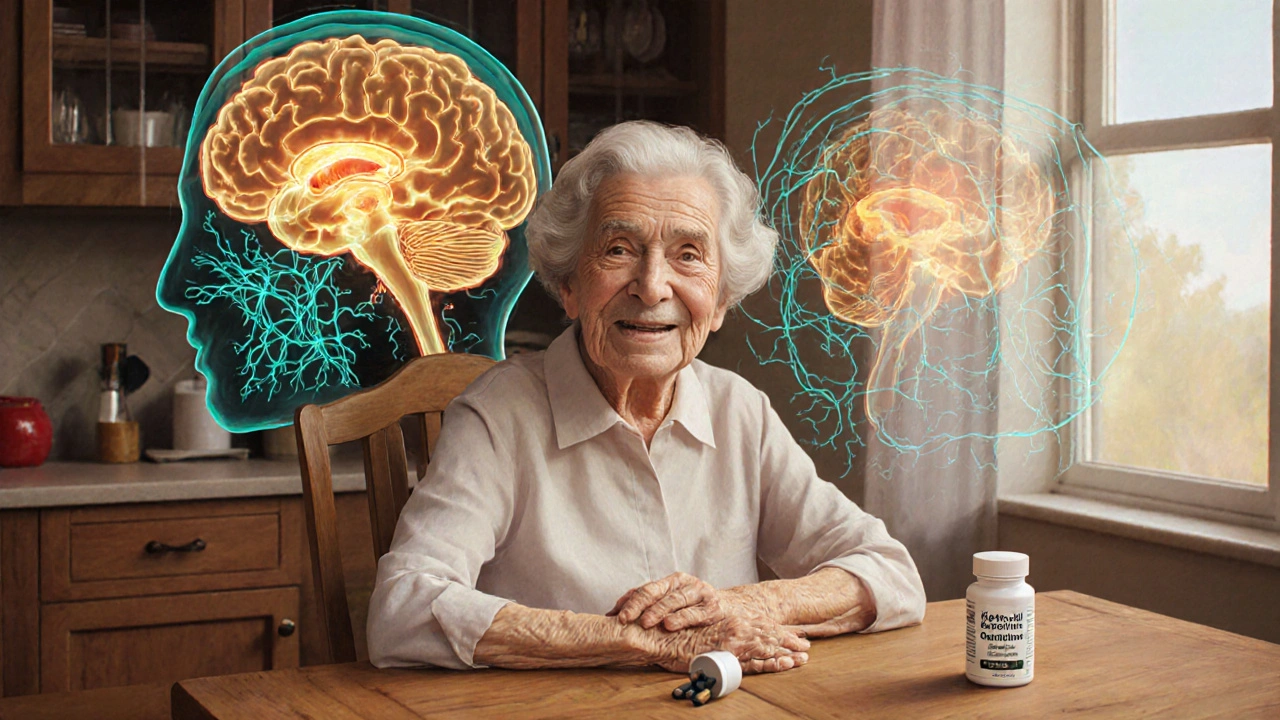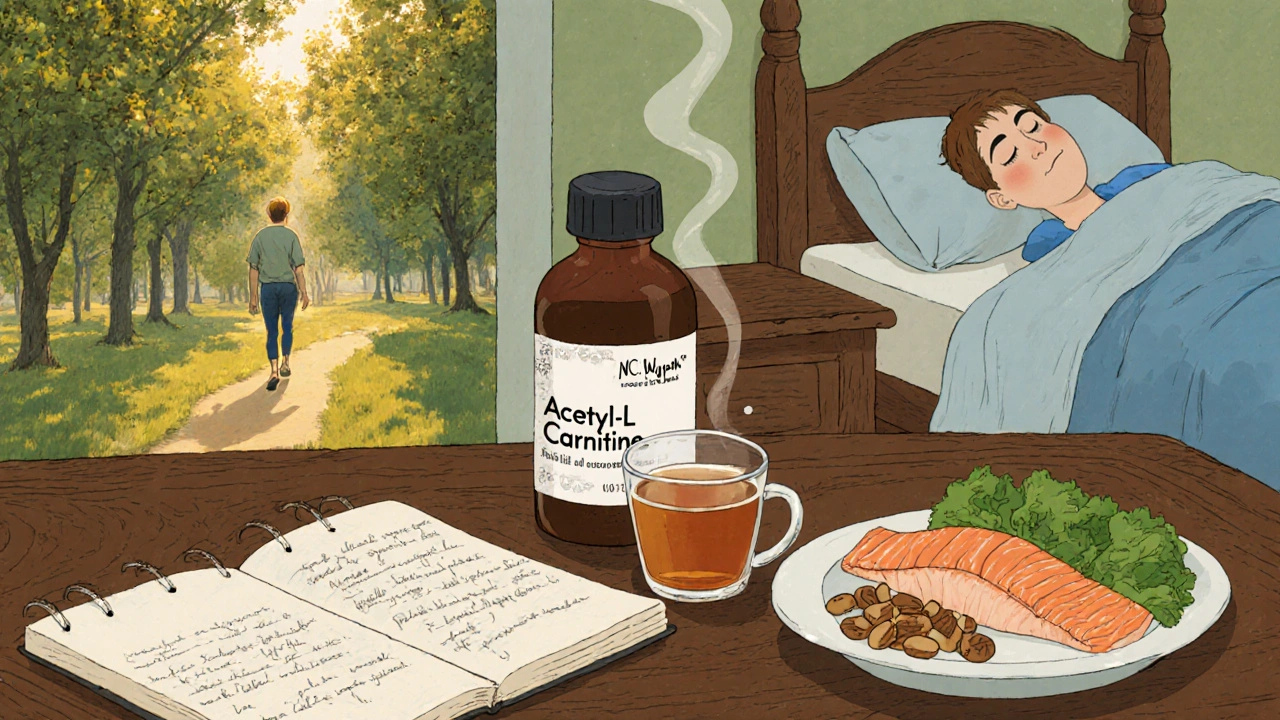Acetyl-L-Carnitine Dosage Calculator
Determine your appropriate starting dosage of Acetyl-L-Carnitine based on age group and depression severity.
Note: For best results, start with the lower end of the recommended dose range and gradually increase as tolerated. Always take with food to reduce stomach upset. Consult your healthcare provider before starting any new supplement.
Did you know a molecule first studied for heart health is now being examined for its mood‑lifting potential? Acetyl-L-carnitine (often shortened to ALC) has moved from the labs of cardiologists to the shelves of mental‑health‑focused supplement stores. If you’ve ever wondered whether ALC can genuinely boost your mood or ease depressive symptoms, this guide breaks down the science, the studies, and the practical steps you can take.
Key Takeaways
- Acetyl-L-carnitine is a naturally occurring compound that helps mitochondria produce energy and supports neurotransmitter balance.
- Clinical trials show modest but consistent improvement in mild‑to‑moderate depression, especially in older adults.
- ALC works best when paired with a healthy lifestyle; it isn’t a magic pill.
- Typical dosages range from 500mg to 2g per day, taken with meals to reduce stomach upset.
- Side effects are rare, but you should check for interactions with antidepressants or thyroid medication.
What Exactly Is Acetyl-L-Carnitine?
When you first see the name, you might think it’s a synthetic drug. In reality, Acetyl-L-Carnitine is a naturally occurring form of the amino‑acid‑like molecule L‑carnitine, bound to an acetyl group. The body produces it in the liver and kidneys, and you also get it from red meat, fish, and dairy.
The acetyl group lets ALC cross the blood‑brain barrier more easily than plain L‑carnitine. Once in the brain, it fuels Mitochondria - the tiny power plants inside every cell - and participates in the synthesis of key neurotransmitters like Serotonin and dopamine.
How ALC May Influence Mood
Two biological pathways are most often cited:
- Energy metabolism: By boosting mitochondrial efficiency, ALC helps neurons generate ATP more reliably, which can improve overall brain resilience.
- Neurotransmitter modulation: ALC donates its acetyl group to produce acetyl‑choline, and it also appears to increase the availability of serotonin and norepinephrine, both of which are low in many forms of depression.
These mechanisms are not unique to ALC but together they create a supportive environment for mood regulation.

Clinical Evidence - What the Studies Say
Research on ALC and depression started in the 1990s, and dozens of Placebo-controlled trials have been published. Here are the most consistent findings:
- Older adults: A 2002 double‑blind trial with 140 participants over 55 showed a 30% reduction in Hamilton Depression Rating Scale scores after 12 weeks of 1.5g/day ALC, compared with a 12% drop in the placebo group.
- Major depressive disorder (MDD) with comorbid fatigue: A 2015 study in 78 patients found that adding 2g/day ALC to standard SSRI therapy improved both mood and self‑reported energy levels more than SSRI+placebo.
- Post‑stroke depression: A 2020 multicenter trial reported that 1g/day ALC for eight weeks reduced depressive symptoms in 42% of participants versus 19% on placebo.
While most studies show a modest effect size (Cohen’s d ≈ 0.3‑0.5), the consistency across age groups and conditions suggests ALC can be a useful adjunct, especially when fatigue is part of the picture.
How ALC Stacks Up Against Other Mood‑Boosting Supplements
People often ask whether ALC is better than other “natural” options. The table below lines up the most studied compounds side by side.
| Supplement | Typical Dose | Evidence Strength | Primary Mechanism |
|---|---|---|---|
| Acetyl-L-Carnitine | 500mg-2g daily | Moderate (multiple RCTs) | Mitochondrial support, neurotransmitter modulation |
| S‑adenosylmethionine (SAMe) | 400mg-1.6g daily | Strong (several meta‑analyses) | Enhances methylation, serotonin synthesis |
| St. John’s Wort | 300mg-900mg daily | Strong for mild‑to‑moderate depression | Inhibits serotonin reuptake (like SSRIs) |
| Omega‑3 fatty acids | 1g-3g EPA/DHA daily | Low‑to‑moderate (mixed results) | Anti‑inflammatory, membrane fluidity |
In short, ALC isn’t the “most powerful” supplement, but it offers a unique blend of energy‑boosting and neurotransmitter‑supporting actions that many other compounds lack.

Dosage Guidelines and Safety Tips
Here’s a practical cheat‑sheet if you decide to give ALC a try:
- Start low: 500mg once a day with breakfast.
- Increase gradually: If tolerated, raise to 500mg twice daily after one week.
- Maximum common dose: 2g per day; higher doses have been used in research but haven’t shown extra benefit.
- Take with food to avoid occasional nausea.
- Watch for interactions: ALC may amplify the effect of thyroid hormones and certain antidepressants (especially MAOIs). Consult a doctor if you’re on prescription meds.
- Pregnancy & breastfeeding: Safety data is limited; avoid unless a physician recommends.
Side effects are rare but can include mild stomach upset, headache, or a brief increase in restlessness. If any symptom worsens, discontinue use and seek medical advice.
Putting It All Together - Practical Steps
Supplementing is only one piece of the puzzle. For the best chance of mood improvement, combine ALC with these habits:
- Regular physical activity: Even a 20‑minute walk boosts mitochondrial function.
- Balanced diet: Include protein (for amino acids), omega‑3 sources, and plenty of vegetables.
- Sleep hygiene: Aim for 7‑9 hours; sleep loss negates many of ALC’s benefits.
- Stress management: Mindfulness or short breathing exercises can enhance neurotransmitter balance.
- Track your mood: Use a simple journal or an app; note changes after 4‑6 weeks of consistent ALC use.
Give it at least a month before deciding if it’s working for you. Mood changes often take time to manifest because the brain’s chemistry adjusts slowly.
Frequently Asked Questions
Can acetyl-L-carnitine replace antidepressants?
No. ALC can complement antidepressants and may allow a lower prescription dose for some people, but it is not a substitute for clinically prescribed medication.
How quickly can I feel a mood lift?
Most users report subtle improvements after 2‑3 weeks, with more noticeable changes around the 4‑6 week mark. Expect a gradual effect rather than an instant boost.
Is ALC safe for older adults?
Yes. Most clinical trials involving seniors used 1‑1.5g daily without serious adverse events. However, check kidney function if you have chronic kidney disease.
Can I take ALC together with St. John’s Wort?
There’s limited research on the combo, but because both influence serotonin pathways, monitoring for serotonin syndrome is wise. Start low and consult a healthcare professional.
Where can I buy a high‑quality acetyl-L-carnitine?
Look for reputable brands that provide third‑party testing (e.g., USP, NSF). Buying from a pharmacy or a well‑known supplement retailer reduces the risk of contaminants.
Bottom line: Acetyl‑L‑carnitine offers a biologically sensible way to support brain energy and neurotransmitter balance. While it isn’t a miracle cure, the evidence backs its modest antidepressant effect, especially when paired with lifestyle habits that nurture overall mental health.


Lauren Sproule
October 17, 2025 AT 12:22Hey folks! i love how this post breaks down the science in a simple way while still staying respektful of different opinions.
CHIRAG AGARWAL
October 27, 2025 AT 14:48Wow, this is just another hype article trying to sell a supplement. The so‑called “latest evidence” sounds like marketing fluff. Who even needs a buzzword like Acetyl‑L‑Carnitine when you can just walk?
genevieve gaudet
November 6, 2025 AT 18:13When we contemplate the subtle dance of molecules within our brains, we are reminded that chemistry is not merely a cold set of reactions but a narrative of vitality. Acetyl‑L‑carnitine, in this sense, can be seen as a humble messenger, ferrying acetyl groups across the blood‑brain barrier like a quiet traveler bearing gifts. Its role in mitochondrial energy production echoes the ancient metaphor of the hearth, where fire sustains life. In the same way, our neurons require a steady supply of ATP to keep the fires of thought burning. The literature cited in the post offers a mosaic of studies, each tile reflecting a modest improvement rather than a miraculous cure. This modesty aligns with the philosophical principle that true change is incremental, not instantaneous. Moreover, the neurotransmitter modulation described evokes the concept of balance, reminiscent of the Taoist yin‑yang, where excess and deficiency find harmony. One must also consider the interplay of mind, body, and environment, for a supplement cannot act in isolation like a lone philosopher in a vacuum. The clinical trials, while promising, remind us that evidence is a living organism, subject to reinterpretation as new data emerges. It is crucial to acknowledge the placebo effect, that powerful psychological ally that can amplify or dampen any pharmacological intervention. Yet to dismiss ALC outright would be to ignore the subtle ways our biochemistry can be nudged towards resilience. The dosage guidelines propose a gradual ascent, much like the disciplined ascent of a mountain climber who respects the altitude. The warnings about interactions with thyroid hormones or antidepressants serve as a reminder of the interconnectedness of bodily systems, a concept echoed in systems thinking. In practice, the advice to pair ALC with exercise, sleep, and nutrition resonates with the holistic view that health is more than a sum of parts. Ultimately, the decision to incorporate ALC into one’s regimen should be guided by personal introspection, medical counsel, and an appreciation for the slow, steady currents of change that shape our mental landscape.
In short, the molecule may not be a silver bullet, but it offers a nuanced tool for those willing to engage with the complexity of their own minds.
Patricia Echegaray
November 16, 2025 AT 21:39Hold up, you’re buying into the mainstream narrative that the pharma giants push “natural” solutions to keep us hooked on endless prescriptions. Think about it: ALC is just another cog in the wellness machine designed to divert attention from the real culprits-big pharma’s patented drugs that they don’t want you to replace. The “moderate evidence” they brag about is often cherry‑picked, leaving out the studies that show zero effect. And let’s not forget the clandestine labs that sprinkle synthetic additives into “natural” supplements, selling us a snake oil cocktail under the guise of science. If you truly want freedom from the mental health industrial complex, don’t chase after any pill, natural or not.
Miriam Rahel
November 27, 2025 AT 01:05Upon a thorough review of the available literature, it becomes evident that the purported benefits of acetyl‑L‑carnitine in mood modulation remain modest at best. While randomized controlled trials suggest a statistically significant improvement, the effect size is insufficient to warrant widespread clinical recommendation without further corroborative evidence. Consequently, a cautious approach is advised when integrating this supplement into therapeutic regimens.
Samantha Oldrid
December 7, 2025 AT 04:30Sure, because we all love waiting for “further corroborative evidence” while feeling miserable.
Roberta Makaravage
December 17, 2025 AT 07:56Let’s get philosophical 🤔: if the brain is a cosmic orchestra, then acetyl‑L‑carnitine is the tuning fork that ensures each instrument plays in harmony. The scientific community has provided a decent repertoire of studies, so it’s not just hype 🎶. Remember, balance is key-combine supplementation with proper nutrition, exercise, and sleep for optimal results 🌟.
Malia Rivera
December 27, 2025 AT 11:22While the metaphor of an orchestra sounds sweet, let’s not forget that real progress comes from owning our health, not relying on foreign‑made pills. The American spirit thrives on self‑reliance, so if ALC can give us an edge, why not seize it? Still, don’t be fooled by slick marketing-do your own research and keep a critical eye on the claims. In the end, it’s about empowering the individual, not becoming a lab rat for multinational corporations.